It is open access week and this year I had the honour of delivering the keynote address at a terrific open access event co-sponsored by the Ryerson University Library and Archives and the University of Toronto Libraries. My talk – which can be viewed in full here or from the embed below – starts with a review of the remarkable success of open access over the past 15 years, but quickly shifts toward the continuing connection between balanced copyright and open access.
I focus on emerging challenges for open access such as the enclosure efforts by publishers, which has led to a growing number of takedowns and the use of digital rights management to lock down publications. With the Canadian Copyright Act review slated to commence shortly, I emphasize the connection between open access, open educational resources and copyright, with some of the key issues involving term extension, notice-and-notice, statutory damages, and fair dealing.
The fair dealing discussion attracted considerable attention as it included new data that demonstrates how educational spending on copyrighted works has increased significantly since the 2012 Supreme Court of Canada decisions and copyright reforms. While critics point to the decline in Access Copyright licensing revenues, data from Canadian universities conclusively shows that this represents a shift (not a decline) in spending, with more dollars are being spent on licensing as schools invest heavily in access that can be used in the classroom and for research purposes. For example, the spending at Dalhousie University since 2012 looks like this:
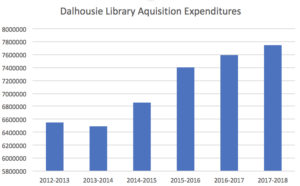
Dalhousie Library Expenditures, https://www.dal.ca/dept/financial-services/reports/budget-advisory-committee–bac–reports.html
The spending at Ryerson shows a similar trend, with major investments in site licenses and e-books. In fact, e-books was not even an expenditure category in 2012, but today outpaces print books, reflecting the greater flexibility of e-books, which can often be used for course materials:
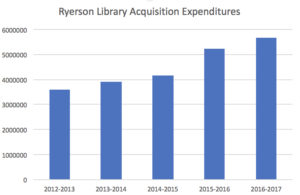
Ryerson Library Acquisitions, https://library.ryerson.ca/info/collections/budget/
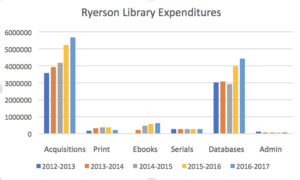
Ryerson Library Expenditures, Detailed, https://library.ryerson.ca/info/collections/budget/
The Dalhousie and Ryerson numbers are consistent with data from Statistics Canada, which surveys the Canadian Association of University Business Officers on university spending. It shows the increased spending since the fair dealing decisions and reform is national in scope.
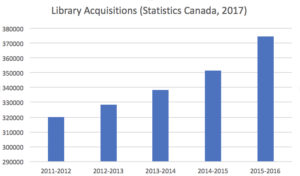
Statistics Canada Library Acquisitions, http://www23.statcan.gc.ca/imdb/p2SV.pl?Function=getSurvey&SDDS=3121
The full talk explores these issues and how those concerned with balanced copyright can become engaged at the institutional, national, and international levels.
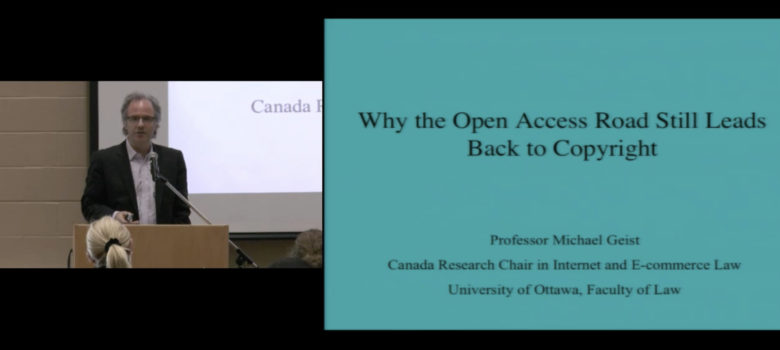







Pingback: Canadian Copyright, OA, and OER: Why the Open Access Road Still Leads Back to Copyright – infojustice
The shift, not decline Geist invokes is a shift to large foreign players away from returning money to independent Canadian authors and small publishers.
Pingback: Video: “Canadian Copyright, OA, and OER: Why the Open Access Road Still Leads Back to Copyright (Presentation by Michael Geist) | LJ infoDOCKET
Isn’t this an argument for less reliance on passive government mandated revenue sharing (ie Copyright Board based collectives) and more on active private sector driven revenue sharing? Not that Copyright Board collectives aren’t doing some of this private sector driven revenue sharing. Bottom line, we need to put more of our IP to work in order to drive innovation. In today’s more sharing based and partnership driven economy, we need to explore new ways to get our IP actively working – both for creators and users. Let’s see if the Copyright Act review takes us there.
So that expense by category chart raises the question: How did dalhousie spending on databases (a purely corporate product) jump 33% ($3 million to $4 million) from 2014-15 to 2015-16? What’s going on there?
Pingback: Music Canada Data Confirms Huge Increase in Streaming Revenues and Sharp Decline of Music Listening from Pirated Sources - Michael Geist
Pingback: The Fight for Fair Copyright Returns: Canadian Government Launches Major Copyright Review - Michael Geist
that sound so good.. i like this page… http://qqpoker88.com